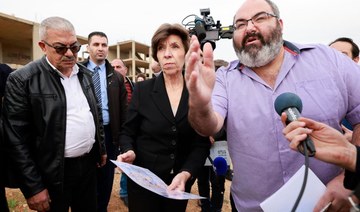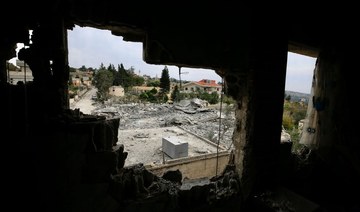BEIRUT: Lebanon is ready to implement a UN resolution that would help end Hezbollah’s cross-border attacks on Israel if Tel Aviv also complies and withdraws from occupied territory, Lebanon’s Prime Minister Najib Mikati said on Friday.
His remarks came as Hezbollah intensified its operations against Israeli military sites amid the heated confrontation on the southern Lebanese front.
UN Security Council Resolution 1701, which ended a 2006 war between Israel and Hezbollah, called for the removal of armed personnel south of Lebanon’s Litani River, except for UN peacekeepers and the Lebanese security forces.
The solution to the latest cross-border hostilities “is the implementation of international resolutions,” including Resolution 1701, Mikati said in his statement.
“We are ready to commit to their implementation, on the condition the Israeli side does the same and withdraws — according to the international laws and resolutions — from occupied territory,” he added.
On Friday, more residents fled their homes in southern Lebanon when Israeli bombing targeted the area.
The UN Development Programme this week published a report providing a preliminary analysis of the impact of the Gaza war on Lebanon and the repercussions of the hostilities in southern Lebanon on the local economy as of Dec. 6.
The report said: “As per the National Council for Scientific Research, or CNRS, 91 towns in Nabatieh and southern Lebanon have faced 1,768 Israeli attacks, including 1,564 airstrikes, 90 incendiary bombs, 62 phosphorus shells, as well as other types of attacks, causing casualties and the displacement of 64,000 civilians scattered across 10 districts.”
The hostilities have directly affected more than 50 villages across four districts — Tyre, Bint Jbeil, Marjayoun and Hasbaya — and destroyed assets and infrastructure, as well as disrupted economic and social services.
Regions that were directly affected by bombing and displacement include all the border villages from Naqoura toward the Shebaa Farms — an area that is 100 km long and 5 km deep.
The Lebanese Ministry of Agriculture reported “the loss of around 47,000 olive trees in the conflict area, representing about 0.44 percent of the total number of olive trees in Lebanon.”
It added that the trees were directly burnt down “due to the use of internationally banned white phosphorous bombs and other explosives.”
The ministry added that the agricultural areas affected by the fires caused by Israel include 97,800 square meters of olive groves, 66,000 square meters of citrus farms and 98,800 square meters of banana farms.
Fires have also ignited in 20,800 square meters of pasture lands.
Moreover, the Agriculture Ministry reported the destruction of a 600-square-meter fodder warehouse and the complete destruction of about 60 agricultural greenhouses.
More than 200,000 birds and chickens and 700 heads of livestock were reported killed, in addition to the destruction of 250 beehives.
In Tyre, fishermen have found it challenging to access fishing grounds due to the conflict.
The report warned that “forest fires caused by white phosphorus bombs significantly impact natural ecosystems, leading to documented incidents of death among mammals, birds and fish.”
It added: “The water infrastructure has been significantly damaged.”
Soil quality in the conflict area had been affected by physical destruction and pollution due to the spread of heavy metals and toxic compounds from explosive weapons, the report said, warning that white phosphorus usage had “further reduced fertility and increased soil acidity.”
Also on Friday, Israeli media reported that a missile and machine gun fire injured several Israeli soldiers on the border with Lebanon.
Israeli media said that “unusual incidents took place on the northern border with Lebanon, and military censorship was imposed on a security event in the north.”
In the afternoon, six missiles were fired from southern Lebanon toward Israeli positions in the Upper Galilee.
Hezbollah announced in the afternoon the targeting of “a gathering of officers and soldiers of the Israeli enemy in Even Menachem with missile weapons, causing confirmed injuries.”
The Lebanese group carried out operations before noon and announced in successive statements that it targeted “a building in the Shomera settlement with a missile launched from Lebanon.”
It then said it had targeted “gatherings of Israeli soldiers in the vicinity of the Shomera barracks with missile and artillery fire, causing direct hits.”
A missile fell near the Nahariya settlement without any sirens sounding.
The Israeli army responded with airstrikes and artillery fire on the Lebanese border area. Jets struck the Labouneh forests south of Naqoura with missiles.
The Israeli shelling of the Ras Naqoura area led to stones flying toward a Lebanese army position in the area. Sirens sounded at the UNIFIL headquarters in Naqoura.
The shelling targeted the outskirts of Aita Al-Shaab, Ramyah, Al-Qawzah, Beit Lif and Jabal Blat near Marwahin, in addition to the outskirts of Tayr Harfa and the Hamoul area in the western sector.
In a statement, the Israeli army said it attacked “military sites as well as terrorist infrastructure of the Hezbollah organization.”
Fighter jets also attacked a series of Hezbollah targets, it added.
Hezbollah mourned two fighters who died in the south: Hussein Ali Ezzedine from the town of Maaroub and Abdul Aziz Ali Maslamani from the town of Al-Shaitiya.
Hezbollah’s Al-Manar channel reported Israeli army soldiers, quoted by the media, as saying that they felt “like sitting ducks on a shooting range” while operating on the border with Lebanon.
The soldiers said: “The pace of events is increasing here; it is a war on everything, and the higher ranks of the army believe everything is fine.”
Mikati: Lebanon ready to apply UN resolution on border if Israel complies
https://arab.news/mx4xy
Mikati: Lebanon ready to apply UN resolution on border if Israel complies

- Southern front sees further escalation as more than 50 villages directly affected
- On Friday, more residents fled their homes in southern Lebanon when Israeli bombing targeted the area
Libya war crimes probe to advance next year: ICC prosecutor

- The Security Council referred the situation in Libya to the ICC in February 2011 following a violent crackdown on unprecedented protests against the regime of Muammar Qaddafi
UNITED NATIONS, United States: The International Criminal Court prosecutor probing war crimes committed in Libya since 2011 announced Monday his plans to complete the investigation phase by the end of 2025.
Presenting his regular report before the United Nations Security Council, Karim Khan said that “strong progress” had been made in the last 18 months, thanks in particular to better cooperation from Libyan authorities.
“Our work is moving forward with increased speed and with a focus on trying to deliver on the legitimate expectations of the council and of the people of Libya,” Khan said.
He added that in the last six months, his team had completed 18 missions in three areas of Libya, collecting more than 800 pieces of evidence including video and audio material.
Khan said he saw announcing a timeline to complete the investigation phase as a “landmark moment” in the case.
“Of course, it’s not going to be easy. It’s going to require cooperation, candor, a ‘can do’ attitude from my office but also from the authorities in Libya,” he added.
“The aim would be to give effect to arrest warrants and to have initial proceedings start before the court in relation to at least one warrant by the end of next year,” Khan said.
The Security Council referred the situation in Libya to the ICC in February 2011 following a violent crackdown on unprecedented protests against the regime of Muammar Qaddafi.
So far, the investigation opened by the court in March 2011 has produced three cases related to crimes against humanity and war crimes, though some proceedings were abandoned after the death of suspects.
An arrest warrant remains in place for Seif Al-Islam Qaddafi, the son of the assassinated Libyan dictator who was killed by rebel forces in October 2011.
Libya has since been plagued by fighting, with power divided between a UN-recognized Tripoli government and a rival administration in the country’s east.
Palestinians rally at historic villages in northern Israel

- The descendants of the 160,000 Palestinians who managed to remain in what became Israel presently number about 1.4 million, around 20 percent of Israel’s population
- Israel has killed more than 35,000 Palestinians in Gaza, mostly women and children, according to the health ministry in the Hamas-run territory
SHEFA-AMR: Thousands of people took part Tuesday in an annual march through the ruins of villages that Palestinians were expelled from during the 1948 war that led to Israel’s creation.
Wrapped in keffiyeh scarves and waving Palestinian flags, men and women rallied through the abandoned villages of Al-Kassayer and Al-Husha — many holding signs with the names of dozens of other demolished villages their families were displaced from.
“Your Independence Day is our catastrophe,” reads the rallying slogan for the protest that took place as Israelis celebrated the 76th anniversary of the proclamation of the State of Israel.
The protest this year was taking place against the backdrop of the ongoing war in Gaza, where fighting between Israel and Palestinian militant group Hamas has displaced the majority of the population, according to the United Nations.
Among those marching Tuesday was 88-year-old Abdul Rahman Al-Sabah.
He described how members of the Haganah, a Zionist paramilitary group, forced his family out of Al-Kassayer, near the northern city of Haifa, when he was a child.
They “blew up our village, Al-Kassayer, and the village of Al-Husha so that we would not return to them, and they planted mines,” he said, his eyes glistening with tears.
The family was displaced to the nearby town of Shefa-Amr.
“But we continued (going back), my mother and I, and groups from the village, because it was harvest season, and we wanted to live and eat,” he said.
“We had nothing, and whoever was caught by the Israelis was imprisoned.”
Palestinians remember this as the “Nakba,” or catastrophe, when around 760,000 Palestinians fled or were driven from their homes during the war that led to the creation of Israel.
The descendants of the 160,000 Palestinians who managed to remain in what became Israel presently number about 1.4 million, around 20 percent of Israel’s population.
Many of today’s Arab Israelis remain deeply connected to their historic land.
At Tuesday’s march, one man carried a small sign with “Lubya,” the name of what was once a Palestinian village near Tiberias.
Like many other Palestinian villages, Al-Husha and Al-Kassayer witnessed fierce battles in mid-April 1948, according to historians of the Haganah, among the Jewish armed groups that formed the core of what became the Israeli military.
Today, the kibbutz communities of Osha, Ramat Yohanan and Kfar Hamakabi can be found on parts of land that once housed the two villages.
“During the attack on our village Al-Husha, my father took my mother, and they rode a horse to the city of Shefa-Amr,” said Musa Al-Saghir, 75, whose village had been largely made up of people who immigrated from Algeria in the 1880s.
“When they returned to see the house, the Haganah forces had blown up the village and its houses,” said the activist from a group advocating for the right of return for displaced Arabs.
Naila Awad, 50, from the village of Reineh near Nazareth, explained that the activists were demanding both the return of displaced people to their demolished villages within Israel, as well as the return of the millions of Palestinian refugees living in the West Bank, Gaza and other countries.
“No matter how much you try to break us and arrest us, we will remain on our lands,” she insisted.
Egypt rejects Israel’s denial of role in Gaza aid crisis

- Sameh Shoukry: “Egypt affirms its categorical rejection of the policy of distorting the facts and disavowing responsibility followed by the Israeli side”
CAIRO: Egypt’s foreign minister on Tuesday accused Israel of denying responsibility for the humanitarian crisis in Gaza after his Israeli counterpart said Egypt was not allowing aid into the war-torn territory.
Israeli troops on May 7 said they took control of the Palestinian side of the Rafah crossing to Egypt as part of efforts to root out Hamas militants in the east of Rafah city.
The move defied international opposition and shut one of the main humanitarian entry points into famine-threatened Gaza. Since then, Egypt has refused to coordinate with Israel aid access through the Rafah crossing.
Sameh Shoukry, Egypt’s foreign minister, said in a statement that “Egypt affirms its categorical rejection of the policy of distorting the facts and disavowing responsibility followed by the Israeli side.”
In a tweet on social media platform X, Israeli Foreign Minister Israel Katz had said, “Yesterday, I spoke with UK Foreign Secretary David Cameron and German Foreign Minister Annalena Baerbock about the need to persuade Egypt to reopen the Rafah crossing to allow the continued delivery of international humanitarian aid to Gaza.”
Katz added that “the key to preventing a humanitarian crisis in Gaza is now in the hands of our Egyptian friends.”
Shoukry, whose country has tried to mediate a truce in the Israel-Hamas war, responded that “Israel is solely responsible for the humanitarian catastrophe that the Palestinians are currently facing in the Gaza Strip.”
He added that Israeli control of the Palestinian side of the Rafah border crossing and its military operations exposes “aid workers and truck drivers to imminent dangers,” referencing trucks awaiting entry to Gaza.
This, he said, “is the main reason for the inability to bring aid through the crossing.”
UN chief Antonio Guterres said he is “appalled” by Israel’s military escalation in Rafah, a spokesman said.
Guterres’ spokesman Farhan Haq said “these developments are further impeding humanitarian access and worsening an already dire situation,” while also criticizing Hamas for “firing rockets indiscriminately.”
Since Israeli troops moved into eastern Rafah, the aid crossing point from Egypt remains closed and nearby Kerem Shalom crossing lacks “safe and logistically viable access,” a UN report said late on Monday.
Daesh claims attack on army post in northern Iraq

- Daesh said in a statement on Telegram it had targeted the barracks with machine guns and grenades
BAGHDAD: Daesh claimed responsibility on Tuesday for an attack on Monday targeting an army post in northern Iraq which security sources said had killed a commanding officer and four soldiers.
The attack took place between Diyala and Salahuddin provinces, a rural area that remains a hotbed of activity for militant cells years after Iraq declared final victory over the extremist group in 2017.
Security forces repelled the attack, the defense ministry said on Monday in a statement mourning the loss of a colonel and a number of others from the regiment. The security sources said five others had also been wounded.
Daesh said in a statement on Telegram it had targeted the barracks with machine guns and grenades.
Iraq has seen relative security stability in recent years after the chaos of the 2003-US-led invasion and years of bloody sectarian conflict that followed.
Israeli forces repeatedly target Gaza aid workers, says Human Rights Watch

- They are among more than 250 aid workers who have been killed in Gaza since the war erupted more than seven months ago, according to UN figures
- Israel has killed more than 35,000 Palestinians in Gaza, mostly women and children, according to the health ministry in the Hamas-run territory
JERUSALEM: Human Rights Watch said on Tuesday that Israel had repeatedly targeted known aid worker locations in Gaza, even after their coordinates were provided to Israeli authorities to ensure their protection.
The rights watchdog said that it had identified eight cases where aid convoys and premises were targeted, killing at least 15 people, including two children.
They are among more than 250 aid workers who have been killed in Gaza since the war erupted more than seven months ago, according to UN figures.
In all eight cases, the organizations had provided the coordinates to Israeli authorities, HRW said.
This reveals “fundamental flaws with the so-called deconfliction system, meant to protect aid workers and allow them to safely deliver life-saving humanitarian assistance in Gaza,” it said.
“On one hand, Israel is blocking access to critical lifesaving humanitarian provisions and on the other, attacking convoys that are delivering some of the small amount that they are allowing in,” Belkis Wille, HRW’s associate crisis, conflict and arms director, said in Tuesday’s statement.
HRW highlighted the case of the World Central Kitchen, a US-based charity who saw seven of its aid workers killed by an Israeli strike on their convoy on April 1.
This was not an isolated “mistake,” HRW said, pointing to the other seven cases it had identified where GPS coordinates of aid convoys and premises had been sent to Israeli authorities, only to see them attacked by Israeli forces “without any warning.”





















